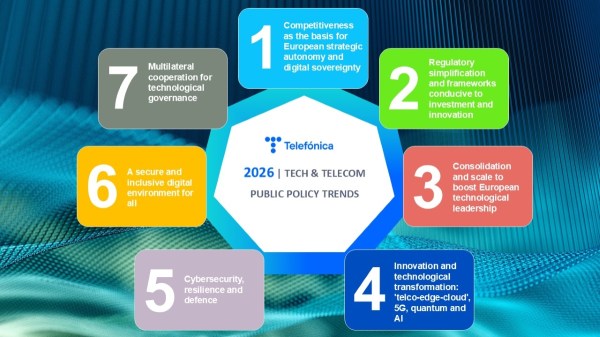The Europeans telecom ministers’ meeting held in Leon provided the opportunity to discuss the future of connectivity in Europe, after the call made by Commissioner Thierry Breton to do “whatever it takes” through a new Digital Network Act. This gathering came at a critical moment to ensure Europe’s digital competitiveness on the world stage.
Europe is readying itself for an ambitious push towards meeting its connectivity targets for 2030. European innovation, economic growth and sovereignty need to be built on digital networks of the future, but at the moment are governed by regulatory frameworks from 25 years ago. The European Commission has listened to stakeholders and is laying the foundation for a framework that looks to the softwarized and cloud-based networks of the future. We welcome the concept of a Digital Networks Act, with the ambition to give Europe cutting-edge digital infrastructure that can deliver growth and innovation, create jobs, and ensure European competitiveness.
As the Digital Networks Act takes shape, we see several critical policy priorities which will help deliver transformational benefits to European citizens, unlocking investment and facilitating the widespread rollout of next generation digital infrastructure needed to power the Digital Decade.
A true single market for telecoms in Europe: gaining scale through in-market consolidation
For the past 30 years, European companies have benefitted from the single market, reaping the benefits of easy cross-border business. Yet, this has not been the case in the telco sector, where legal and policy hurdles prevent a true telecoms single market. The sector remains highly fragmented across Europe, undermining telcos’ abilities to benefit from economies of scale. The resulting extra cost and blocking efficiency gains further exacerbate the funding gap that European connectivity faces.
In his vision for a Digital Networks Act Commissioner Breton sums up the responses to the exploratory consultation on the future of connectivity: “Telecoms operators need scale and agility to adapt to this technology revolution, but market fragmentation holds them back.” In-market consolidation will build the environment in which telcos can efficiently and effectively work towards building the backbone for Europe’s digital future as it is a precondition for the creation of a true single telecoms market. To build scale is a fundamental step to ensure that European telecom operators can be globally competitive.
An investment environment to unlock the internet of the future
Without major investments, Europe will not be able to achieve the connectivity targets it has set itself, risking a divide between first- and second-class digital citizens. This must be a common European effort. Telecoms operators have invested continuously, to upgrade networks capacity to levels at which it can satisfy the never-ending increase in demand. These investments are necessary, they are important, but they are not enough to push Europe forward. In fact, the first Report on the State of the Digital Decade shows that at current trend, we will not reach our Digital Decade targets.
Europe needs a new investment environment that enables the huge effort in rollout required to achieve the 2030 targets and continue the network transformation for the digital era, tackling low returns for network operators and finding a new financing model that allows for sustainable, secure, and efficient use of Europe’s networks.
Our proposal is to work on a range of instruments that can help to deliver the necessary investment through a variety of means, including ensuring that those who put the highest burden on digital connectivity make a proportionate contribution to its sustainable future. The initiative also aims to encourage major traffic generators to take greater responsibility for the traffic they generate, to be more aware of the impact of their traffic on the additional resources required by digital networks, and to incentivize traffic efficiency and sustainability. Our proposal aims at exploring ways to free up resources for investment in network capacity to be used for coverage expansion and innovation, but also to reduce energy consumption and CO2 emissions by reducing traffic inefficiencies. As telecom operators bear most of the costs of inefficient network use, policy makers should incentivise all players in the Internet value chain to finally agree on models where all parties contribute to efficient network use and balanced business relationships taking into account the services they provide to each other.
A spectrum policy that enables investment
A true single market for telecoms in Europe sets the foundation for efficient, effective investments. A harmonized approach towards pro investment spectrum policies would ensure the adequate allocation of resources with a much greater impact on the expansion and quality of connectivity.
Bold action is needed to align telecoms policies with European industrial policy. The European Commission proposal to start working on a Digital Networks Act should be an appropriate way forward to set the conditions for European telcos to deliver the secure, future-ready networks European citizens need. The Digital Networks Act should place digital connectivity back at the heart of the European economy.
The ground is prepared, we must now sow the seeds. 2030 is round the corner, and we have no time to lose.







